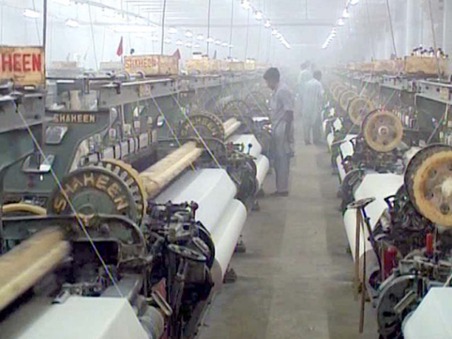INP-WealthPk
Ahmed Khan Malik
Thousands of power loom units across Karachi are on the verge of closure due to surging electricity tariffs, escalating production costs, and declining demand. Industry stakeholders warned that unless the government intervened swiftly, the city could see massive job losses and a sharp decline in textile exports — a vital source of national revenue. For decades, the power loom industry has been the backbone of Karachi’s textile sector, providing employment to hundreds of thousands of workers.
These units — ranging from small workshops to medium-sized factories — produce fabrics that feed both domestic and export markets. However, the recent economic downturn has hit them hard. Electricity prices have risen dramatically, making it nearly impossible for many units to sustain operations. According to loom owners, energy bills have doubled, while the prices of raw material such as yarn and dyes have also surged. Combined with high interest rates and inflation, profit margins have been reduced to almost zero.
“Every month we are working just to pay electricity bills and wages,” said Amjad Khan, a loom owner from the SITE area. “If this continues, we will have no option but to shut down.” Across Karachi’s industrial zones — including Korangi, SITE, and Orangi Town — many small power looms have already reduced production or closed their doors. Workers, mostly daily-wage earners, face uncertainty as factories cut shifts or delay payments. Some have been forced to return to their hometowns after years of working in the city’s textile sector.
The situation mirrors crises seen in other textile hubs across Pakistan. Rising input costs and weak exports have created a nationwide challenge for the textile industry. In Karachi, however, the threat is particularly severe because of its dependence on imported raw material and higher utility charges compared to other cities. Industry representatives estimated that if the current conditions persisted, up to 40% of power looms in Karachi could shut down within the next six months. Such closures would lead to large-scale unemployment, with thousands of skilled and unskilled workers affected.
The city’s power looms association has repeatedly appealed to the federal and provincial governments for urgent relief, demanding reduced electricity and gas tariffs, tax rebates, and the restoration of subsidised rates for small and medium-sized textile units. “The sector’s collapse would not only destroy livelihoods but also shrink the government’s own tax revenues. When factories close, workers lose jobs and the government loses income.
We need policies that help industries survive, not push them out of business,” said Mustafa Tufail, the association’s secretary general. He said that the government should create a dedicated financial support programme for the textile value chain — including spinning, weaving, dyeing, and finishing units — to modernise operations and improve energy efficiency.

Credit: INP-WealthPk













